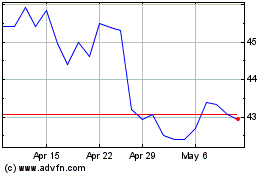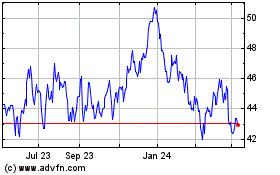Australia's Whitehaven Set to Buy Two BHP, Mitsubishi Coal Mines -- Update
October 17 2023 - 7:50PM
Dow Jones News
By Rhiannon Hoyle
BHP Group, the world's biggest miner by market value, on
Wednesday named Australia's Whitehaven Coal as the preferred bidder
for two steelmaking coal mines it owns with Japan's Mitsubishi
Corp.
Earlier this year, BHP said the joint venture was seeking a
buyer for its Daunia and Blackwater mines in the Bowen Basin of
Australia's coal-rich Queensland state. The BHP Mitsubishi
Alliance, Australia's largest producer and exporter of
metallurgical coal, is narrowing its focus on high-quality coal it
expects steel mills will increasingly buy to help curb their carbon
emissions.
"BHP confirms that Whitehaven Coal has been selected as the
preferred bidder in the divestment process," the miner said in a
quarterly production report on Wednesday. It didn't provide any
further details on the bid or the timing of any deal, and a
spokesman declined to comment.
Whitehaven requested trading in its shares stop until it makes
an announcement on its bid for the mines.
The Blackwater and Daunia mines produce millions of metric tons
each year of mostly metallurgical coal for steel that's shipped
mainly to buyers across Asia. The Blackwater mine, opened in 1967,
is one of the longest coal mines in the Southern Hemisphere.
The mines produce lower-quality coal than some of the joint
venture's other operations, and BHP previously said those two mines
would struggle to compete for future investment. "What we are doing
here is further concentrating our portfolio on the best-of-the-best
assets," BHP Chief Executive Mike Henry said in February.
BHP last year sold its controlling interest in two other mines
to Stanmore Resources in a roughly $1.35 billion deal. It also sold
a minority interest in a Colombian mine to Swiss commodities giant
Glencore.
BHP sought to sell its last thermal-coal mine, the Mt. Arthur
coal operation in Australia, but failed to secure a buyer. Last
year, BHP said it would instead keep mining the pit for several
years before closing it and beginning rehabilitation work.
The world's top miner has been pivoting toward commodities it
expects to enjoy higher demand amid a global energy transition,
especially industrial metals copper and nickel, and fertilizer
ingredient potash.
BHP bought Australian copper miner OZ Minerals in May in what
was its biggest acquisition in more than a decade. Before that, it
struck a deal with Australia's Woodside Energy to offload its
global petroleum business.
Still, coal remains an important money-spinner for the mining
giant. BHP's coal interests contributed 18% of the group's
underlying Ebitda in the year through June, with a margin of
46%.
BHP says it believes high-quality metallurgical coal will be
needed to fuel blast furnaces in the steel industry for decades to
come, underpinned by growth in steelmaking in countries such as
India, which--unlike China--relies on imports of steelmaking
coal.
"Higher quality coking coals are expected to be valued for their
role in reducing the greenhouse gas emissions intensity of blast
furnaces," BHP said in an earnings report in August.
On Wednesday, BHP reported a fall in output of metallurgical
coal and steelmaking ingredient iron ore for the first quarter of
its fiscal year, but said its copper production was sharply higher
versus a year earlier. It said it is on track to meet fiscal-year
production and cost estimates set for all its operations.
Write to Rhiannon Hoyle at rhiannon.hoyle@wsj.com
(END) Dow Jones Newswires
October 17, 2023 20:35 ET (00:35 GMT)
Copyright (c) 2023 Dow Jones & Company, Inc.
BHP (ASX:BHP)
Historical Stock Chart
From Dec 2024 to Jan 2025

BHP (ASX:BHP)
Historical Stock Chart
From Jan 2024 to Jan 2025
